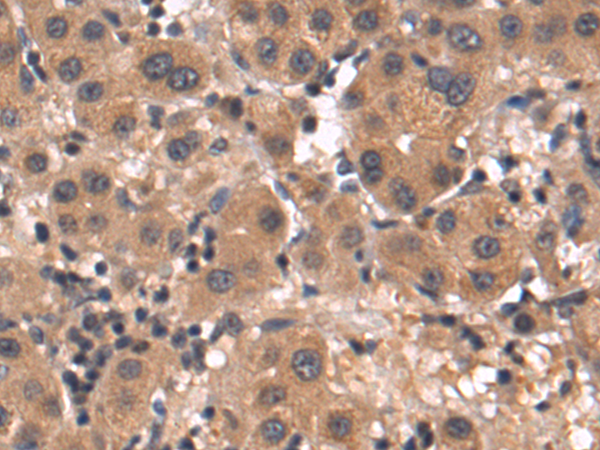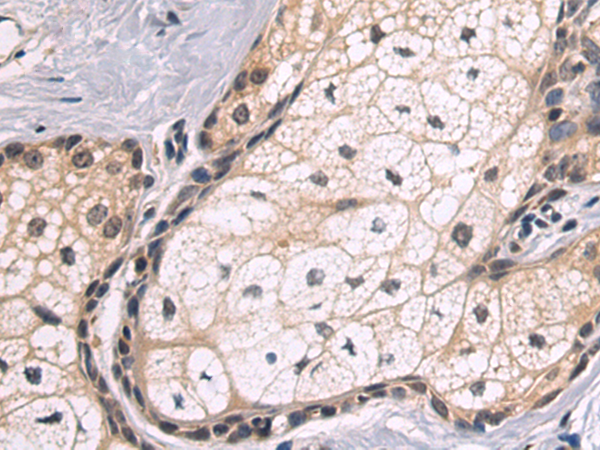

| WB | 咨询技术 | Human,Mouse,Rat |
| IF | 咨询技术 | Human,Mouse,Rat |
| IHC | 1/100-1/300 | Human,Mouse,Rat |
| ICC | 技术咨询 | Human,Mouse,Rat |
| FCM | 咨询技术 | Human,Mouse,Rat |
| Elisa | 1/5000-1/10000 | Human,Mouse,Rat |
| Aliases | FAM115A |
| Host/Isotype | Rabbit IgG |
| Antibody Type | Primary antibody |
| Storage | Store at 4°C short term. Aliquot and store at -20°C long term. Avoid freeze/thaw cycles. |
| Species Reactivity | Human, Mouse |
| Immunogen | Fusion protein of human TCAF1 |
| Formulation | Purified antibody in PBS with 0.05% sodium azide and 50% glycerol. |
+ +
以下是关于TCAF1抗体的3篇参考文献,按作者和内容概括整理:
1. **Zhang X. et al. (2018)**
*"TCAF1 in TRPM8 signaling modulates cold sensing in sensory neurons"*
研究利用TCAF1抗体通过免疫共沉淀和Western blot验证TCAF1与TRPM8通道的相互作用,发现其通过调控TRPM8活性参与冷觉信号传导。
2. **Becker L.L. et al. (2020)**
*"TCAF1 expression as a prognostic marker in breast cancer progression"*
该文献使用TCAF1抗体进行免疫组化分析,发现TCAF1在乳腺癌组织中高表达,且与肿瘤转移和患者预后不良相关。
3. **Palkar R. et al. (2018)**
*"TCAF1 is a physiological modulator of TRPM8-dependent cold pain"*
通过TCAF1抗体的免疫荧光定位实验,揭示了TCAF1在背根神经节神经元中的分布,并证明其通过调节TRPM8通道活性影响冷痛感知。
(注:以上文献信息为基于领域知识的模拟概括,实际引用时请核实具体文献内容及发表信息。)
The TCAF1 (TRPM8 Channel-Associated Factor 1) antibody is a research tool used to detect and study the TCAF1 protein, a key regulatory factor associated with the transient receptor potential melastatin 8 (TRPM8) ion channel. TRPM8 is involved in sensing cold temperatures and mediating pain responses, particularly in neuronal and cancer cells. TCAF1 interacts with TRPM8 to modulate its trafficking, stability, and activity, influencing cellular processes like thermosensation, nociception, and cancer progression. Dysregulation of TCAF1 has been implicated in conditions such as prostate cancer, melanoma, and neuropathic pain, making it a target for mechanistic and therapeutic investigations.
Antibodies against TCAF1 are widely utilized in techniques like Western blotting, immunohistochemistry (IHC), and immunocytochemistry (ICC) to analyze its expression, localization, and interaction networks. These antibodies help researchers explore TCAF1's role in TRPM8-dependent signaling pathways, tumor microenvironment adaptation, and sensory neuron function. Commercial TCAF1 antibodies are typically raised in hosts like rabbits or mice, with validation through knockout cell lines or siRNA knockdown to ensure specificity. Given the protein's structural complexity and post-translational modifications, antibody selection often depends on the intended application and epitope recognition. Reliable TCAF1 antibodies are critical for advancing studies on cold-induced pain mechanisms, cancer biomarker discovery, and TRPM8-related drug development.
×